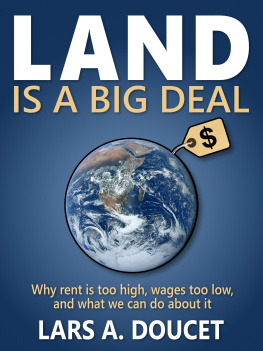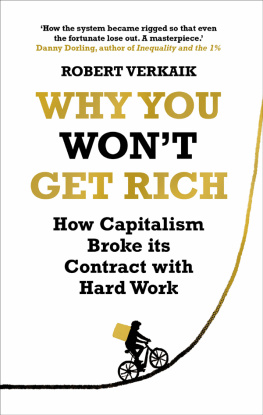
Share the Wealth
Share the Wealth
How to End Rentier Capitalism
Philippe Askenazy
Translated by Gregory Elliott

This English-language edition first published by Verso 2021
First published as Tous rentiers!: Pour une autre rpartition des richesses
Odile Jacob 2016
Translation Gregory Elliott 2021
All rights reserved
The moral rights of the author have been asserted
1 3 5 7 9 10 8 6 4 2
Verso
UK: 6 Meard Street, London W1F 0EG
US: 20 Jay Street, Suite 1010, Brooklyn, NY 11201
versobooks.com
Verso is the imprint of New Left Books
ISBN-13: 978-1-78873-937-5
ISBN-13: 978-1-78873-939-9 (US EBK)
ISBN-13: 978-1-78873-938-2 (UK EBK)
British Library Cataloguing in Publication Data
A catalogue record for this book is available from the British Library
Library of Congress Cataloging-in-Publication Data
A catalog record for this book is available from the Library of Congress
Library of Congress Control Number: 2020947559
Typeset in Minion Pro by MJ & N Gavan, Truro, Cornwall
Printed in the UK by CPI Group (UK) Ltd, Croydon, CR0 4YY
Contents
This essay was inspired by constant discussion with Katia. I must thank Odile Jacob, who knew exactly how to motivate me, as well as her team, particularly Galle Jullien, for their support and careful attention in reading the French manuscript. The Verso team and Gregory Elliott supplied their decisive expertise to adapt the text for an international audience. This updated and expanded version of Tous rentiers! (Paris: Odile Jacob, 2016) has also benefited from comments following presentations, especially at the International Labour Organization in Geneva, UCLouvain and the University of Luxembourg.
Whereas universal and lasting peace can be established only if it is based upon social justice;
And whereas conditions of labour exist involving such injustice, hardship and privation to large numbers of people as to produce unrest so great that the peace and harmony of the world are imperilled; and an improvement of those conditions is urgently required
Preamble to the Constitution of the International Labour Organization (ILO), adopted in Philadelphia, 10 May 1944, reiterating the initial considerations of chapter 13, creating the ILO, from the Versailles Peace Treaty, signed on 28 June 1919
In the United States, the Democrats are struggling to prevent the re-election of Donald Trump. Across the Atlantic, European social democracy has collapsed. It holds barely 20 per cent of the seats in the European Parliament elected in May 2019. For the most part, its historical parties of government when they have not virtually disappeared, like the French Socialists or Greeces PASOK. For now, ecologists or anti-capitalists have only filled the political vacuum on an occasional basis. Despite the tumult of Brexit, Labour was not able to return to office. It took the exceptional combination of a major institutional crisis with Catalonia and a widespread corruption scandal for a socialist without a majority to come to power in Spain. In East Asia, too, only a major scandal in 2017 installed a democrat in the South Korean presidency. In Japan, since the start of the century, democrats and social democrats have only been in power for a brief interlude of three years.
The Left Caught in the Trap of the Neoliberal Fable
Yet, well before the Covid-19 crisis, awareness of climate change, denunciation of madcap finance, and civic movements of the 99 per cent should have resulted in domination by social democracy, as well as a modern US liberalism, and potentially led to a renewal of the trade unions close to these currents. But their ideas and actions have remained imprisoned in the straitjacket of the fables of neoliberalism. One of these concerns the origins of inequalities in the advanced economies: primary inequalities prior to redistribution are said to be natural and reflect peoples individual productivity. The disturbing increase in them over recent decades allegedly derives from globalization and, even more so, the technological revolutions that inexorably polarize society between winners and losers. On the winners side are capitalists, the heroes of the entrepreneurial class, professional experts, senior management, and so forth. On the losers side are routinized workers, the unproductive, the toiling classes, who are set to disappear or experience stagnation in their incomes. Spatial inequalities themselves supposedly mirror productivity differentials between regions. This trend, dictated by technology, is bound to continue. With the gig economy, the employed wage-earning class has entered its twilight years. With robots and artificial intelligence, the jobs of the so-called middle class, already in decline, will disappear.
Subscribing to this fable involves an insidious defeatism a defeatism that may be characterized as progressive neoliberalism, to adopt a term used by the feminist philosopher Nancy Fraser in analysing the defeat of Hillary Clinton.
Progressivists call for secondary redistribution to bring about a more egalitarian allocation of wealth and ensure the development of the whole of a territory. But this strategy is no longer feasible. How can consent to taxation be maintained when growing primary inequality requires more corrective social transfers at the expense of investments in the public services, including hospitals? How can investment and redistribution via taxation be promoted in societies a majority of whose members are small property owners, who reject taxation on assets other than, perhaps, those of the very wealthy?
Hence the conversion to a third way that has its origins in Blairism and Clintons period of governance. In the name of pragmatism and efficiency, the goal of equality is abandoned in favour of an illusory equality of opportunity. Universal education remains a priority, but beyond that everyone will get a minimal welfare safety net, to enable them to bounce back. Spatial mobility must help people to leave behind an area condemned to decline. Thus will everyone be the entrepreneur of their own life, which will have the effect of blurring social origins. Protected work contracts are accused of obstructing equality of opportunity by erecting barriers to employment for the unemployed and casual workers. Privatization makes it possible not only to boost public finances, but also to abolish such barriers.
Thus, equality of opportunity is not content to take cognizance of a neoliberal order; it consolidates it. In the advanced economies, considered reforms must abolish dogmas read: reduce workers protections and rights where they still exist in order to adapt society to the neoliberal order. If they are not to hamper competitiveness, workers demands must be reasonable. Such was the agenda of Matteo Renzi in Italy and of Franois Hollande in France in the mid 2010s the latter accentuated by Emmanuel Macron.
However, abandoning the goal of equality leaves the biggest barriers to social mobility intact: social and geographical origin, parental financial resources, leisure activities, schools attended these are powerful determinants in defining peoples career opportunities, and even their health.
And support for the neoliberal order undermines a key facet of the progressive programme: the struggle against the economic discrimination suffered by women and various minorities. For the latter are overrepresented among the
Next page









